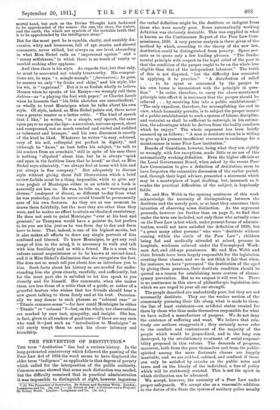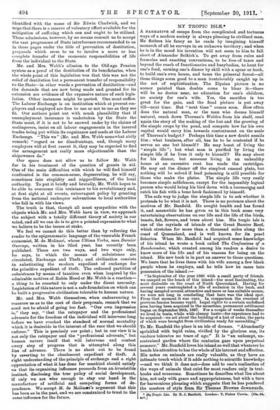THE PREVENTION OF DESTITUTION.*
THE term "destitution " hUs had a curious history. In the long-protracted controversy which followed the passing of the Poor Law Act of 1834 the word seems to have displaced the older term "indigence" as applicable to that degree of poverty which called for the interposition of the public authority. Common-sense showed that some such distinction was needed, but.the difficulty remained that in practical administration it was impossible to distinguish at sight, however ingenious • (1) The Prevention of Destitution. By Sidney and Beatrice Webb, London: Longman and Co. 113s. ret.3—(2) Grants in did: a Criticism and a Proposal. By Sidney Webb. London : Longman, and Co. [5s. net.]
the verbal definition might be, the destitute or indigent from those who were merely poor. Some automatically working definition was obviously desirable. This was supplied in what is known as the Continuance Report of the Poor Law Com- missioners, 1839. A very precise analysis is there given of the• method by which, according to the theory of the new law,.
destitution could be distinguished from poverty. Space per- mits- us to quote only a few leading phrases. "The funda-
mental principle with respect to the legal relief of the poor is that the condition of the pauper ought to be on the whole less. eligible than that of the independent labourer." The truth- of this is not disputed, " but the difficulty has consisted in applying it to practice." "A distribution of relief . . . to be spent or consumed by the pauper in his own house is inconsistent with the principle in ques- tion." "In order, therefore, to carry the above-mentioned principle into effect it is necessary that the pauper should be relieved . . . by receiving him into a public establishment?'
"The only expedient, therefore, for accomplishing the end in view, which humanity permits, is to subject the pauper inmate of a public establishment to such a system of labour, discipline, and restraint as shall be sufficient to outweigh, in his estima- tion, the advantages which be derives from the bodily comforte which he enjoys." The whole argument has been briefly summed up as follows : " A man is destitute when he is willing to give up his present insufficient resources in exchange for a maintenance in some Poor Law institution."
Boards of Guardians, however, being what they are, rightly or wrongly, with few exceptions, made little or no use of this' automatically working definition. Even the higher officials at the Local Government Board, when asked by the recent Poor- Law Commission to give a definition of destitution, seem to- have forgotten the exhaustive discussion of the earlier period, and, through their legal adviser, presented a statement which may be a masterpiece of legal drafting, but, inasmuch as it evades the practical difficulties of the subject, is hopelessly futile.
Mr. and Mrs. Webb in the opening sentences of this work acknowledge the necessity of distinguishing between the destitute and the merely poor, or at least they announce their intention of observing some distinction. As the argument. proceeds, however (no further than on page 3), we find that under the term are included, not only those who actually come on the Poor Law (a test which, under present forms of adminis- tration, would not have satisfied the definition of 1839), but "a great many other persons" who were "destitute without coming within the circle of the Poor Law "; children being fed and medically attended at school, persons in hospitals, workmen relieved under the Unemployed Work- men Act, and ,old-age pensioners. Mr. and Mrs. Webb and their friends have been largely responsible for the legislation creating these classes, and we do not think it fair that when, for instance, we have " prevented " the destitution of the aged by giving them pensions, their destitute condition should be quoted as a reason for establishing more centres of eleemo- synary prevention. But so we suspect it will ever be. There is no continence in this sieve of philanthropic legislation into- which we are urged to pour all our strength.
The people described are undoubtedly poor, but they are not necessarily destitute. They are the weaker section of the community pursuing their life 'along, what is made to them, the line of least resistance—an artificial status created for them by those who thus make themselves responsible for what we have called a manufacture of paupers. We do not deny the existence of suffering and want; We believe that rela- tively our authors exaggerate it ; they certainly never refer to the comfort and contentment of the majority of the- people which would be • jeopardized, and in the long run destroyed, by the revolutionary treatment of soeial responsi-
bility proposed in this volume. The demands of progress,. moreover, both from the poor themselves and from the public- spirited . among the more fortunate classes are happily insatiable, and we are cribbed, cabined, and confined if these can only be satisfied by attacks on the public rates and
and on the liberty of the individual, a line of policy- which will be stubbornly resisted. This is not the spirit in, which civilization can be advanced. • We accept, however, the necessity of a Poor Law under proper safeguards. We accept also as a reasonable addition, to the duties of the State the system of sanitary police usually- identified with the name of Sir Edwin Chadwick, and we urge that there is a reserve of voluntary effort available for the mitigation of suffering which can and ought to be utilized. These admissions, however, by no means commit us to accept the vast programme of State interference recommended to us in these pages under the title of prevention of destitution, proposals which seem to us to involve a more or less complete transfer of the economic responsibilities of life from the individual to the State.
Mr. and Mrs. Webb's allusion to the Old-age Pension system as a proof of the destitution of its beneficiaries, when the whole point of this legislation was that this was not the relief of destitution but a permanent transfer of responsibility to the Stele—in other words a prevention of destitution—and the demands that are now being made and granted for its extension are evidence of the expansive nature of such legis- lation. Other instances might be quoted. One must suffice. The Labour Exchange is an institution which at present em- ployers and employed are free to use or not to use as they see fit. Our authors point out with much plausibility that if unemployment, insurance is undertaken by the State the State must, if it is not to be snowed under by the claims of malingerers, insist on all labour engagements in the insured trades being put within its cognizance and made at the Labour Exchange. "This we" (Mr. and Mrs. Webb somewhat airily remark) "regard as no disadvantage, and, though many employers will at first resent it, they may be expected.to find the arrangement not really more objectionable than the shipowners do."
Our space does not allow us to follow Mr. Webb far in his treatment of the question of grants in aid, One of the main difficulties with which he will find himself confronted is the common-sense, degenerating, he will say, sometimes into stupidity and niggardliness, of the local authority. To put it briefly and brutally, Mr. Webb hopes to be able to overcome this resistance to his revolutionary and, at first sight at all events, extravagant policy by granting from the national exchequer subventions to local authorities who fall in. with has views.
The truth is that, though all must sympathize with the objects. which Mr. and Mrs. Webb have in view, we approach the subject with a totally different theory of society in our mind, and all we can do is to give a pointed expression to what we believe-to be the issues at stake.
We feel we cannot do this better than by referring the reader to the epigrammatic language of the venerable French economist, M. de. Molinari, whose Ultima Verba, .mon Bernier Overage, written in his 92nd year, has recently been published. There are two ways, and two ways only, he says, in which the means of subsistence are circulated, Exchange and Theft ; and civilization consists in substituting the modern expedient of exchange for the ,primitive expedient of theft. The enforced partition of subsidences by means of taxation even when inspired by the admirable motives of Robin Hood or Mr. Webb is a reaction— a thing to be resorted to only under the direst necessity. Legislation of this nature is not a safe foundation on which can be built a progressive civilization tolerable to human nature.
Mr. and Mrs. Webb themselves, when endeavouring to reassure us as to the cost of their proposals, remark that we need not be afraid of going too fast. " Our own impresaion is," they say, " that the ratepayer and the professional advocate for the freedom of the individual will intervene long before we- have reached the standard of normal mentality which it is desirable in the interest of the race that we should enforce." This is precisely our point ; but in our view it is not only the ratepayer and the "professional advocate," but human nature itself that will intervene and contest every step of progress that is attempted along this line of advance. There is no short cut to be found by reverting to the obsolescent expedient of theft. A right understanding of the principle of exchange and a right appreciation of what it has done for mankind should satisfy us that its organizing influence proceeds from an irresistible instinct, disclosing the true policy of social development, if only we are wise enough to stay our band in the manufacture of artificial and competing forms of de- pendence. We accept M. de Molinari's argument that this has been so in the past, and we are constrained to trust to the same influence for the future.











































 Previous page
Previous page